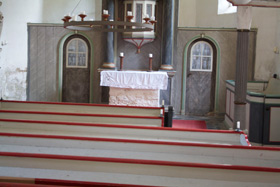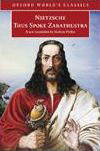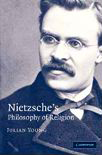The Life of Nietzsche - Page 1

It was a propitious day: October 15, 1844. As if the family blood line could no
longer endure another pastor, Friedrich Wilhelm Nietzsche, the firstborn son of Carl
Ludwig Nietzsche and Franziska Oehler, was at last born; it was in the presbytery of Röcken,
a region of Saxony annexed by Prussia. When Friedrich was baptized on the 24th of October,
his father read aloud from Luke 1:66: “Everyone who heard this wondered about it, asking,
‘What then is this child going to be?’ For the Lord’s hand was with him.” The church bells surely rang out in
honor of him, though they could not know whom they were honoring . . .
 It seems fittingly paradoxical that the man who would announce the death of God, and later refer to himself as the
anti-Christ and pose as Dionysus in opposition to the Crucified, would come forth from a lineage of devout believers.
The church, in a sense, gave birth to its fiercest opponent and one of the most influential and dynamic philosophers of
the modern age. “The Protestant pastor is the grandfather of German philosophy . . .” (The Antichrist, s. 10).
On Nietzsche's father's side, the men had been pastors since the early 17th century, and only one born of such a spiritual
lineage would have the coruscating insight which Nietzsche had into the nature of religion; even several men on the
maternal side of the family were pastors, too. In 1849, when Nietzsche was but five, his father died of softening of the brain
(encephalitis or apoplexy).
It seems fittingly paradoxical that the man who would announce the death of God, and later refer to himself as the
anti-Christ and pose as Dionysus in opposition to the Crucified, would come forth from a lineage of devout believers.
The church, in a sense, gave birth to its fiercest opponent and one of the most influential and dynamic philosophers of
the modern age. “The Protestant pastor is the grandfather of German philosophy . . .” (The Antichrist, s. 10).
On Nietzsche's father's side, the men had been pastors since the early 17th century, and only one born of such a spiritual
lineage would have the coruscating insight which Nietzsche had into the nature of religion; even several men on the
maternal side of the family were pastors, too. In 1849, when Nietzsche was but five, his father died of softening of the brain
(encephalitis or apoplexy).
Speculations have been made that he had syphilis, which the philosopher may have acquired congenitally, or later in a brothel,
while other scholars dispute this claim. The loss of his father in his youth and his own physical sufferings, whatever their origin,
would have an effect on the development of his philosophy and the manner in which he endured suffering, loss, and death.
Shortly after this death, his younger brother died, leaving him and his sister Elisabeth as the sole children of the family.
In his youth, aside from the expected religious instruction, Nietzsche began studying Latin, Greek, German literature, and
classical works at Pforta. He composed music and poetry, and wrote essays on philology and literature for Germania. During
this time, he developed a passion for writing, a mode of self-discipline, a fervor for music, and while suffering from severe if
not excruciating headaches and vision problems (he had been diagnosed with myopia of varying grades and aniscoria when he was only
four years of age), struggled for self-mastery while learning to overcome many deaths (in his youth, his Aunt Auguste and his grandmother,
Erdmuthe, both of whom lived with the family, died). Hölderlin, who was not well-known or revered at the time, was one of Nietzsche's favorite poets
(Byron was another); he had written on essay on him, revealing even in his youth a certain iconoclasm; his professor found this essay disconcerting,
and encouraged the young Nietzsche to develop interest in less fevered and saner writers. Paul Deussen, who later became a renown scholar of Sanskrit and with whom
it is probable Nietzsche frequently discussed Buddhism, was one of Nietzsche's few close friends during this period. Deussen was also the son of a pastor,
and as Nietzsche, expected to follow in the footsteps of his father; however, though they were confirmed together in March of 1861, they had more of an
enthusiasm for ancient Greece and poets such as Anacreon.

While engaged at Pforta, Nietzsche, along with his friends Wilhelm Pinder and Gustav Krug, formed Germania, a club devoted to poetry, music, and
scholarship. During their monthly meetings, they would each contribute a work. Nietzsche's early contributions concerned music and later poetry,
and it was here where he would have the first audience for his thoughts. In the meantime, Nietzsche's headaches and eye condition intensified,
and beginning roughly in the spring of 1862, a spiritual crisis erupted due to religious doubts. In a later letter to his sister Elisabeth, Nietzsche remarked, “If you wish to strive for peace of
soul and pleasure, then believe; if you wish to be a devotee of truth, then inquire” (June 11, 1865). Nietzsche later claimed that while at Pforta he ceased to utter the blessing at meals
(in spring of 1865 he chose to forgo attending church services) and was seriously considering a musical career, as his passion for music remained a primary force.
In 1864, he would leave Pforta, his last literary act there being an essay on the Greek poet Theognis; by this time, Nietzsche chose to become a philologist.
 In the fall of 1864, Nietzsche, along with Deussen, began
studying classical philology first in Bonn, then in Leipzig.
With his background in Greek and Latin literature, Nietzsche
already had a firm foundation on which to base his commitment
to this discipline. One of his professors, Friedrich Ritschl,
who would be a mentor to Nietzsche, was an established scholar
in Latin literature and was the world expert on Plautus.
At the University of Bonn, Nietzsche attended both theology
and philology classes; though he had not abandoned the study
of theology altogether, he pursued with great interest Greek
literature, art and philosophy, history, and history of art,
focusing in particular on Greek tragedies and Theognis. During
this time he continued to compose songs and music, and encountered
David
Strauss's controversial book, The Life of Jesus, Reworked
for the German People; his religious crisis was on the
verge of a turning point, from which many conflicts arose
at home, especially with his mother.
In the fall of 1864, Nietzsche, along with Deussen, began
studying classical philology first in Bonn, then in Leipzig.
With his background in Greek and Latin literature, Nietzsche
already had a firm foundation on which to base his commitment
to this discipline. One of his professors, Friedrich Ritschl,
who would be a mentor to Nietzsche, was an established scholar
in Latin literature and was the world expert on Plautus.
At the University of Bonn, Nietzsche attended both theology
and philology classes; though he had not abandoned the study
of theology altogether, he pursued with great interest Greek
literature, art and philosophy, history, and history of art,
focusing in particular on Greek tragedies and Theognis. During
this time he continued to compose songs and music, and encountered
David
Strauss's controversial book, The Life of Jesus, Reworked
for the German People; his religious crisis was on the
verge of a turning point, from which many conflicts arose
at home, especially with his mother.
continues on Page 2...
Subscribe
To receive site updates, news, and announcement from NC via email. To do so, you simply need to provide your email address below.
-
Nietzsche on Language, Consciousness, and the BodyBy Christian J. Emden
University of Illinois Press, 2005
Reviewed by Daniel Blue"...drawing on much previously unpublished and undiscussed Nietzsche material, Emden examines the role of metaphor and interpretation, reasserting the relevance of rhetoric to philosophy, in consonance with Nietzsche's own statements and practices"
-
Nietzsche's New DarwinismBy John Richardson
University of Illinois Press, 2005
Reviewed by Bradley Park (St. Mary's College of Maryland)"...The strength of Richardson’s book is that it does not merely discuss the influence of Darwin’s thought on Nietzsche or catalog points of similarity and difference"
-
Thus Spoke ZarathustraBy Friedrich NietzscheA new translation by Graham Parkes
Oxford University Press, 2005
Reviewed by Horst HutterThis new translation of Nietzsche’s magnum opus is by far the best available in the English language. It should find its way to the desk of all students who do not have access to the original German.
-
Nietzsche’s Philosophy of ReligionBy Julian YoungCambridge University Press, 2006
Reviewed by Horst Hutter,
Concordia UniversityEvery student of Nietzsche in the Anglophone world should read this book. It is a most able treatment of a much-ignored and much-misunderstood topic close to the very heart of the writings of this seminal thinker.







